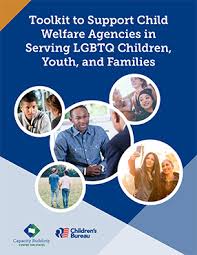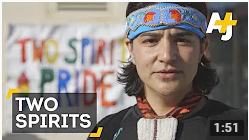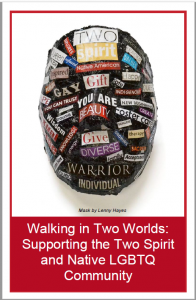This resource discusses the overrepresentation of LGBTQ youth in homeless and runaway populations.
National Resource Center for Permanency and Family Connections (2012)
 Provides links to knowledge- and skill-building resources; including articles, videos, tools, training curricula, tip sheets, information briefs, websites, and other products, to help state and territorial child welfare agencies meet the needs of LGBTQ children, youth, and families.
Provides links to knowledge- and skill-building resources; including articles, videos, tools, training curricula, tip sheets, information briefs, websites, and other products, to help state and territorial child welfare agencies meet the needs of LGBTQ children, youth, and families.
Children’s Bureau, Child Welfare Information Gateway
 “Two-spirit” is how some Native Americans describe people whose gender identity doesn’t fit as strictly male or female. Meet Ty DeFoe, who’s using traditional dance to take this gender identity back from the negative connotations established during colonization. Shot by video journalist Courtney Quirin for AJ+
“Two-spirit” is how some Native Americans describe people whose gender identity doesn’t fit as strictly male or female. Meet Ty DeFoe, who’s using traditional dance to take this gender identity back from the negative connotations established during colonization. Shot by video journalist Courtney Quirin for AJ+
 Created by the MN Indian Women’s Sexual Assault Coalition with the assistance of Lenny Hayes as a consultant, this educational booklet aims to educate and bring awareness of the issues that impact Two-Spirit/Native LGBTQ individuals and community for tribal communities, individuals, organizations, and the overall LGBTQ community. This booklet was designed to also help other populations get a basic understanding of the term Two-Spirit, what it means to individuals who identify, and to understand the impact of violence of all forms on this population.
Created by the MN Indian Women’s Sexual Assault Coalition with the assistance of Lenny Hayes as a consultant, this educational booklet aims to educate and bring awareness of the issues that impact Two-Spirit/Native LGBTQ individuals and community for tribal communities, individuals, organizations, and the overall LGBTQ community. This booklet was designed to also help other populations get a basic understanding of the term Two-Spirit, what it means to individuals who identify, and to understand the impact of violence of all forms on this population.
To print this booklet you must first contact MIWSAC for permission. Contact information is at the end of the booklet.
 This document is one of three in a compendium of sexual and reproductive health guidance and resources for child welfare jurisdictions from a national workgroup convened by CSSP. The goal of this document is to provide jurisdictions with a means of helping youth (in foster care or extended care) in understanding their SRH care rights, and give them practical information that will help them exercise their rights and getting their service needs met. The other two documents in this series include a policy and practice framework for child welfare leaders and policy makers and a practical tool meant specifically for use by caseworkers. Both this document and the one designed for caseworkers are aligned with the recommendations on current best practices around SRH policy and practice contained in the policy framework. Includes LGBTQ+ specific considerations and resources.
This document is one of three in a compendium of sexual and reproductive health guidance and resources for child welfare jurisdictions from a national workgroup convened by CSSP. The goal of this document is to provide jurisdictions with a means of helping youth (in foster care or extended care) in understanding their SRH care rights, and give them practical information that will help them exercise their rights and getting their service needs met. The other two documents in this series include a policy and practice framework for child welfare leaders and policy makers and a practical tool meant specifically for use by caseworkers. Both this document and the one designed for caseworkers are aligned with the recommendations on current best practices around SRH policy and practice contained in the policy framework. Includes LGBTQ+ specific considerations and resources.